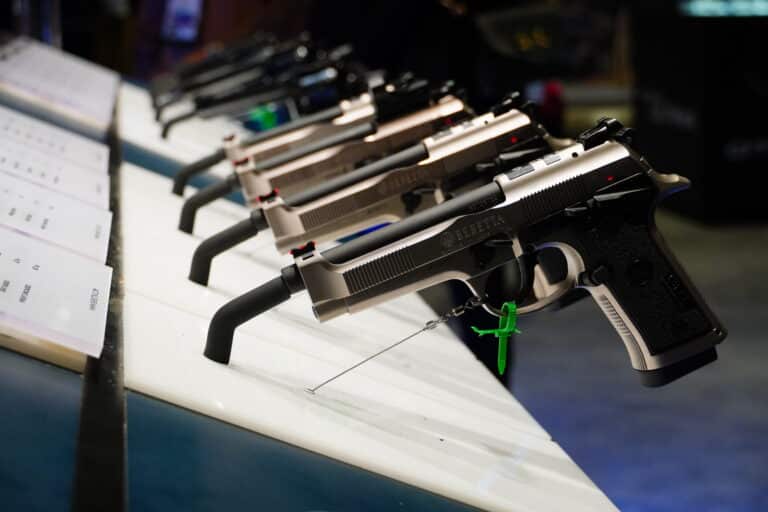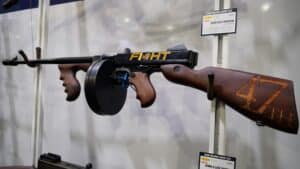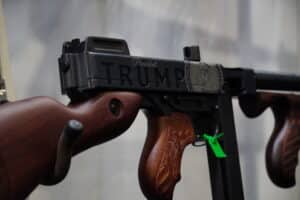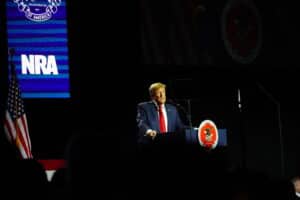Thursday’s Vice Presidential debate sparked the most substantive back-and-forth on gun policy of the entire campaign.
During a–perhaps surprisingly–civil exchange between Republican JD Vance and Democrat Tim Walz, the Vice Presidential candidates laid out their views on school shootings, city gun violence, and rural suicides. The pair detailed competing visions on gun policy but also found several areas where they had at least some agreement.
“I think that Governor Walz and I actually agree we need to do better on this,” Vance said during the CBS News debate. “The question is just how do we do it?”
The exchange, which felt a bit like a throwback to an earlier era, quickly overtook the few seconds spent on guns in the debate between Donald Trump and Kamala Harris as the longest of the election season. Although, the fight between Harris and Trump over whether she’d confiscate Americans’ firearms was significantly more bombastic and focused on the area of greatest disagreement between the campaigns. Still, Thursday’s more substantive exchange could provide remaining undecided voters further policy details for making up their minds in a race that polling indicates is exceptionally close.
The section on guns began with a question about holding the parents of school shooters responsible for their children’s crimes. Vance said it would depend on the details of each case, noting a situation where a parent actively or negligently facilitated the shooter’s access to firearms would be different from one where they didn’t. He then advocated for greater school security measures, including stronger doors and windows, as well as more school resource officers.
He said he didn’t like the idea of his kids having to go to hardened schools but argued there aren’t better options right now.
“The idea that we can magically wave a wand and take guns out of the hands of bad guys just doesn’t fit with recent experience,” Vance, a Senator from Ohio, said. “So, we’ve gotta make our schools safer. I think we’ve gotta have some commonsense, bipartisan solutions for how to do that.”
Walz, the Governor of Minnesota, noted his son had witnessed a shooting when they were 17 years old. He said he believes Vance wants to stop school shootings but argued more gun restrictions were needed to do that.
“This is a good start to the conversation. I one hundred percent believe Senator Vance hates it when these kids… it’s abhorrent. It breaks your heart,” he said. “But that’s not far enough when we know there are things that work.”
“I’m a hunter. I own firearms. The Vice President is,” Walz added a few moments later. “We understand that the Second Amendment is there, but our first responsibility is to our kids.”
Walz pointed to the “red flag” law and expanded requirements for background checks on private gun sales he signed in Minnesota–measures which Vance opposes–as examples of restrictions he wants to see at a national level.
“There are reasonable things we can do to make a difference,” he said. “It’s not infringing on your Second Amendment. The idea to have some of these weapons out there, it just doesn’t make any sense.”
Walz pointed to Finland as an example of a country that doesn’t have school shootings “even though they have a high gun ownership rate.”
“No one is trying to scaremonger and say we’re taking your guns,” he said. “But I ask all of you out there, do you want your schools hardened to look like a fort? Is that what we have to do when we know there’s countries around the world that their children aren’t practicing these kinds of drills, they’re being kids.”
Vance expressed his condolences to Walz for his child having to experience a shooting, which Walz thanked him for. He then agreed with Walz that Finland could illustrate some of the problems in the United States, which he said has a higher rate of substance abuse and depression.
“We, unfortunately, have a mental health crisis in this country that I really do think we need to get to the root causes of because I don’t think it’s the whole reason why we have such a bad gun violence problem,” Vance said, “but I do think it’s a big piece of it.”
Walz responded by saying he also wants robust mental health funding, but he insisted guns were in and of themselves part of the problem.
“Just because you have a mental health issue doesn’t mean you’re violent,” Walz said. “I think what we end up doing is we start looking for a scapegoat. Sometimes it just is the guns. It’s just the guns, and there are things that you can do about it.”
Vance pointed to illegal cross-border gun trafficking and violence in cities as another part of the problem. He said stricter enforcement was one solution.
“This is why we have to empower law enforcement to arrest the bad guys, put them away, and take gun offenders off the streets,” Vance said.
Walz responded by noting that suicides were the leading cause of gun deaths in his state and said most happened in rural areas. He argued there was a need to look at those as much as big city homicides.
“We have an epidemic of children getting guns and shooting themselves,” he said. “So, we have, and we should look at, all the issues.”
Vance said, “There’s a whole host of things we can do here,” but school security should be high on the list.
CBS News’ Norah O’Donnell asked Walz about why he abandoned his opposition to a ban on so-called assault weapons after the discussion on school safety. That is perhaps the widest gun policy gap between the two campaigns, with Harris and Walz backing a ban while Trump and Vance oppose it. Walz described a meeting with parents who’d lost children in the 2012 Sandy Hook shooting as a catalyst for why he changed his position.
“I sat in that office with those Sandy Hook parents,” he said. He argued times had changed, and more gun restrictions were now necessary.
“Look, I was an NRA guy for a long time,” Walz said. “They used to teach school safety. I’m of an age where my shotgun was in my car so I could peasant hunt after football practice. That’s not where we live today.”
Still, neither candidate touched on some of the most controversial gun-related issues in the campaign. Kamala Harris’s support for a 2005 measure banning the possession of handguns in San Francisco wasn’t mentioned, nor was her campaign’s recent walkback of her 2019 support for a mandatory buyback of assault weapons. Donald Trump’s inability to legally own firearms in the wake of his felony convictions wasn’t brought up either.
However, the candidates did finish their discussion of gun policy on a polite note.
“I think this is a healthy conversation,” Walz said. “I think there’s a capacity to find solutions on this that work to protect the Second Amendment and protect our children. That’s our priority.”
Donald Trump has not agreed to do a second debate with Harris. So, Thursday’s exchange may be the last back-and-forth on gun policy between the two campaigns before election day.






